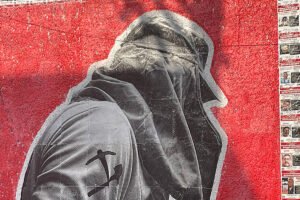
January 7, 2020; Vice
According to the most recent federal data, as of 2017, an estimated 14.1 million US adults lack bank accounts and another 48.9 million US adults are “underbanked,” meaning that many rely on check-cashing and payday loan services that charge ultra-high interest rates to meet financial needs.
More than one in four Americans lack adequate access to credit. Nationally, the Federal Deposit Insurance Corporation (FDIC) reports that 6.5 percent of households are unbanked and 18.7 percent are underbanked.
How can this be remedied? One option that NPQ has covered would be to activate the US postal system to provide limited banking services, a practice that is common in other countries and was practiced in the US itself from 1911 to 1967. At the federal level, US Senator Kirsten Gillibrand (D-NY) has been a leading advocate.
Now comes a more high-tech option. As Jordana Rosenfeld reports in Vice, “In November, New York State Assembly member Ron Kim, Senator Julia Salazar, and Robert Hockett—a Cornell law professor— announced their Inclusive Value Ledger (IVL) proposal.” The bill is numbered Assembly Ordinance 8686, with a parallel measure (Senate Ordinance 6792) in the state senate. The bill, if passed, “would create the country’s first publicly owned electronic banking platform, as well as a digital currency that can be exchanged for goods and services within the state.”
In a public statement, Kim said:
I believe that our proposal, the Inclusive Value Ledger, has the potential to be truly revolutionary. The creation of a free public savings and payment platform that all New Yorkers can use, not only to pay for goods and services but also to transfer money directly to each other through, could fundamentally reshape New York into a fairer, healthier, wealthier, and more inclusive place for all.
Sign up for our free newsletters
Subscribe to NPQ's newsletters to have our top stories delivered directly to your inbox.
By signing up, you agree to our privacy policy and terms of use, and to receive messages from NPQ and our partners.
The system aims to help people who are often unpaid or underpaid, such as those who care for the elderly and children or cook for others. In New York state, the numbers of unbanked are even higher than national numbers—with an estimated eight percent unbanked and 23.8 percent underbanked.
“People who are unbanked,” notes Rosenfeld, “often cite distrust of the banking system, lack of access to government-issued ID, or inability to maintain a minimum balance as reasons they don’t have bank accounts.”
Rosenfeld adds, “Since most over-the-table jobs and many public benefit programs pay by check or direct deposit, people without bank accounts often have to pay a significant chunk of their income to predatory payday lenders or check-cashing businesses in order to convert their earnings into cash.”
The centerpiece of the proposal is the creation of what is described as a “public Venmo”—that is, “a publicly administered, non-extractive payment system that would allow recipients to spend freely within the state economy without transaction fees or delays.” In particular, this system would allow the state to deliver tax-return money, benefit, or cash assistance payments directly to residents’ “e-wallets.” Since these payments in New York total an estimated $55 billion a year, state participation would anchor the system.
Additionally, once money is in e-wallets, people could use the system to transact with fellow state residents. This is the “statewide complementary currency” part. As Hockett and Kim put it in a N.Y. Daily News op-ed, money between you, “your friends, your family, and local businesses” could be “freely exchanged between e-wallets for goods and services, stored over time in a secure, truly free, publicly owned and administered payments system.”
Local currencies, as NPQ has noted, are gaining ground. Rosenfeld herself cites the BerkShares, a local currency in western Massachusetts, and Banco Palmas, which has spawned imitators in 52 favelas throughout Brazil. The Schumacher Center for a New Economics in Massachusetts offers a map of these systems worldwide.
Of course, the New York proposal is broader, defining its community as the entire state. And the goal is not just a local currency, but really a kind of electronic public bank. Moving from proposal to institution requires many steps, but this effort seems well worth following.—Steve Dubb











